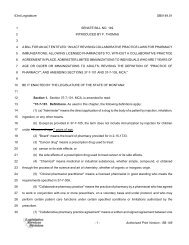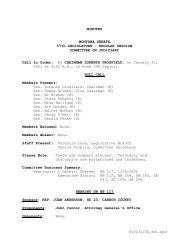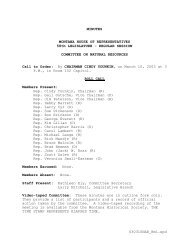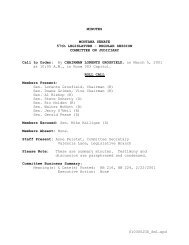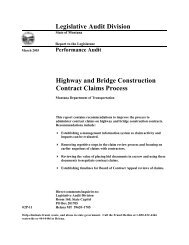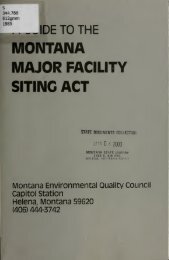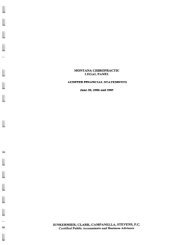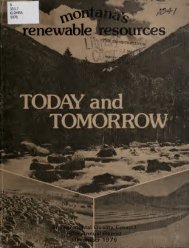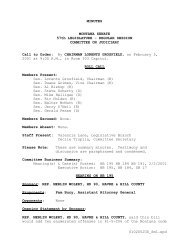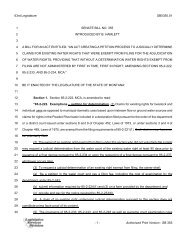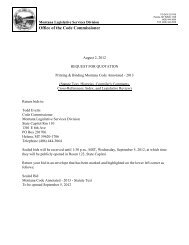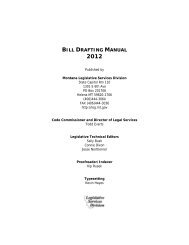Public Comment. Volume III - Montana Legislature
Public Comment. Volume III - Montana Legislature
Public Comment. Volume III - Montana Legislature
You also want an ePaper? Increase the reach of your titles
YUMPU automatically turns print PDFs into web optimized ePapers that Google loves.
Crude Oil and Petroleum Products Pipeline<br />
Construction<br />
How Long Does it Take to Obtain Permission to<br />
Build a Pipeline in <strong>Montana</strong>?<br />
Governmental permitting and the MEPA -<br />
environmental review - process, as well as right-ofway<br />
acquisition, typically begin at least 2 years<br />
prior to construction. The MEPA process takes at<br />
least 1 year, and may take up to 5 years,<br />
depending upon the identified issues and ,<br />
alternatives.<br />
Are Pipeline Construction Standards Different for<br />
Private Lands than for Government Lands?<br />
No. Pipelines are constructed according to strict<br />
standards regulated by the U.S. Department of<br />
Transportation OfFice of Pipeline Safety. The<br />
construction standards apply equally to all portions<br />
of the pipeline, regardless of whether it traverses<br />
public land or private land.<br />
The construction-related standards include<br />
minimum burial depth, valve and pipe pressure<br />
rating requirements, weld qualification and testing,<br />
hydrostatic pressure testing requirements, cathodic<br />
protection systerr~ requirements to prevent<br />
corrosion, external coating requirements, pipe<br />
bending specifications, and numerous inspection<br />
requirements.<br />
A great deal of attention is also applied to<br />
reclamation standards to ensure the land is<br />
returned to the previous use in a satisfactory<br />
manner.<br />
Should <strong>Montana</strong>'s Eminent Domain Statutes be Modified with Regard to Crude Oil and Petroleum<br />
Products Pipelines?<br />
The <strong>Montana</strong> Petroleum Association does not believe that it would be in the best interest of the citizens of the<br />
State of <strong>Montana</strong>, nor the citizens of the United States of America to make substantive changes to <strong>Montana</strong>'s<br />
eminent domain statutes. Changes made to the present eminent domain statutes could unduly burden<br />
interstate commerce, and could even be inconsistent with interstate commerce laws.<br />
Eminent domain ensures the vitality of our nations petroleum supply and distribution system. Without the<br />
eminent domain procedures to obtain right-of-way, a single individual could deny thousands, or even millions<br />
of people a safe, affordable, dependable, and environmentally superior mode of transportation for their<br />
petroleum energy needs.<br />
<strong>Montana</strong>'s eminent domain statutes run very deep with history. The statutes are necessarily complex, and<br />
there is a large body of case law interpreting them. A balanced, logical process is currently in place, which<br />
allows rejection of a written offer, requires demonstration of necessity, and finally, provides for valuation of the<br />
property by a commission. There may be opportunities to combine statutory provisions and "modernize" the<br />
statutory language, but the functionality and intent of the statutes should not be changed.<br />
Crude Oil and Petroleum Products Pipeline in <strong>Montana</strong><br />
March 2000<br />
Prepared by the <strong>Montana</strong> Petroleum Association<br />
-1 74- <strong>Volume</strong> Ill: <strong>Public</strong> <strong>Comment</strong><br />
Page 4



